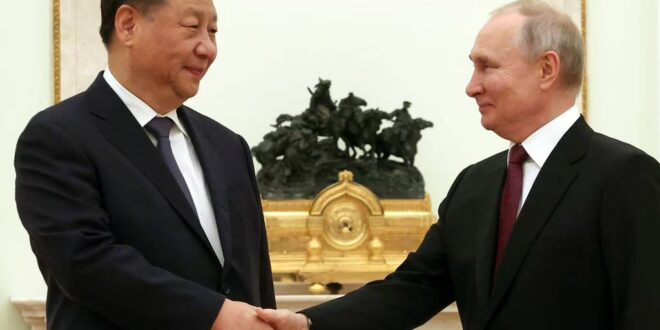Chinese President Xi Jinping traveled to Russia this week for a three-day visit at a particularly critical point in the 13 month-old war in Ukraine.
Russian President Vladimir Putin was indicted by the International Criminal Court several days earlier for war crimes, the first time the high court has charged a head of state in over a decade. The Russian war effort in Ukraine remains in a state of purgatory, with thousands of Russian convicts continuing to be mowed down by Ukrainian troops in the eastern city of Bakhmut and recruits openly begging Putin to save them from their own commanders.
This is the 40th time Xi and Putin have met since 2013. The relationship between the two men is hardly one of equals. Putin, shut off from the West economically and diplomatically, hasn’t had much choice but to move deeper into the arms of Russia’s superpower neighbor to the east. The Russians are increasingly playing a subservient role, a country whose only leverage over Beijing is its untactful ability to make additional blunders negatively affecting China’s own security.
Fortunately for Putin, China has thus far been willing to step into the breach economically and diplomatically. Beijing teamed up with Moscow during the G-20 finance ministers’ meeting in February to block an official statement condemning Russia’s war in Ukraine and faulting the conflict for exacerbating global food supply shortages.
If it wasn’t for China, the Russians would be totally isolated on the U.N. Security Council. The Chinese government frequently regurgitates Kremlin talking points, blames NATO for poking Moscow in the eye at every opportunity, and condemns the United States and its allies in Europe and Asia for turning geopolitics into a morality contest.
China’s economic contributions have been even more important for Putin. With a European Union oil import ban in place, China is now the biggest market for Russian fossil fuels. According to Chinese customs figures, Beijing purchased more than $50 billion worth of Russian crude in 2022, a 45% increase from the previous year. Russian natural gas imports to China are up by 155% over the same period.
While the yuan is nowhere near replacing the dollar, Russia is relying more on Chinese currency — the Russian Central Bank reported that $6 billion in yuan was in the Russian banking system, up from zero since the start of the year. China is now the main source of the chips needed to power everything from household appliances to weapons systems.
Even so, these numbers can be deceiving. China isn’t serving as a lifeline for Putin out of the goodness of its heart. The moves are more about exploiting the desperate hole Russia finds itself in and striking deals that are advantageous to China’s economic interests.
This wouldn’t be the first time the Chinese have acted in such fashion. In 2014, after Putin annexed Crimea, China exploited the situation by striking a $400 billion natural gas deal with the Russians on cheaper terms than what Gazprom, a Russian energy company, would have received from the Europeans. With most of Europe weaned off Russian oil and natural gas, and with alternative markets stretched, Russia has little choice but to accede to China’s wishes.
China also has bigger fish to fry. If saving Russia was Xi’s sole foreign policy objective, he could discount international reaction to his policies. Beijing, however, doesn’t have that luxury. There are other global equities at stake, including the need to preserve profitable commercial ties with the West and the desire to embark on a diplomatic rapprochement (or at least a mini-reconciliation) with the U.S. and Europe’s main powers. The Chinese have a $1.5 trillion trading relationship with the West to protect, and it’s highly unlikely Xi is willing to jeopardize it when he is seeking to put three years of COVID-19-induced isolation behind him.
The need to preserve workable relations with the West is likely one of the motivations for the Chinese Foreign Ministry’s proposed Ukraine peace plan, which aimed to tread a fine line between not throwing Putin under the bus and presenting something the U.S. and Europe could at least discuss. China has had difficulty with the latter part, with leaders such as NATO Secretary-General Jens Stoltenberg openly alleging that China can’t serve as an impartial broker because it refuses to call Russia’s war in Ukraine an illegal act of aggression.
U.S. National Security Council spokesman John Kirby was unimpressed with the peace formula’s calls for an immediate cease-fire on the road to end-of-war negotiations between Moscow and Kyiv. “While a cease-fire sounds good, it actually ratifies Russia’s gains on the ground,” Kirby said last week.
For now, China is firmly in Russia’s court. Putin is banking on that support continuing.
But U.S. policymakers would be making a critical judgment error if they assumed the China-Russia relationship was some type of strategic alliance, akin to what the U.S. has with its NATO allies.
For President Xi, Russia is still a useful foil against the U.S., even if the country’s long-term economic outlook is bleak and it has nothing to contribute beyond cheap energy. Ultimately, China wants a Russia strong enough to be useful, but weak enough not to be a challenge to its own goals and aspirations.
 Eurasia Press & News
Eurasia Press & News




